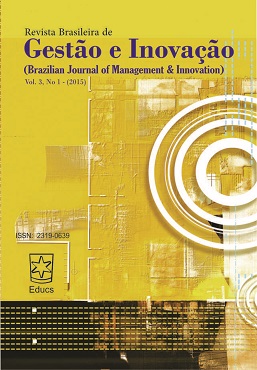FATORES DETERMINANTES PARA O ENTENDIMENTO DO MARKETING PÚBLICO NO SERVIÇO DE CONTROLE DE ATIVIDADES URBANAS NUMA PREFEITURA MUNICIPAL
Abstract
O serviço de controle de atividades urbanas vem sendo alvo de questionamento pela sociedade quando ao seu desempenho. As ferramentas do marketing público podem ser utilizadas como instrumento para auxiliar na melhoria do desempenho, sendo os 4Ps a base teórica adotada para identificação destas ferramentas. Logo, identificar os fatores determinantes para o entendimento do marketing no serviço público ganha importância. Através de um questionário validado é possível, com num número menor de variáveis, ter um entendimento das percepções do servidor público com relação ao marketing público, permitindo ao gestor diagnosticar o cenário atual e adequar o ambiente para implantação destas ferramentas. Partindo do quadro proposto por Kaplan e Haenlein (2009), estruturou-se uma pesquisa quantitativa, descritiva e de corte transversal. A pesquisa foi feita na Prefeitura de Vitória, ES, através de questionários impressos, obtendo-se uma amostra com 104 respondentes. Após a caracterização dos respondentes e validação da amostra foi feita uma análise fatorial. Obteve-se como resultado que o Fator Interação (F1) compreende o fator mais determinante, na percepção do marketing no serviço público pelos servidores da SEDEC, que atuam no serviço de controle de atividades urbanas, seguido do Fator Custo-Benefício (F2), do Fator Condições de Pagamento (F3) e do Fator Disponibilidade (F4). Esta pesquisa teve como principal contribuição acadêmica propor um método para medir o entendimento do marketing no setor público, algo raro na literatura. Como contribuição secundária, propõe um novo campo de interesse aos pesquisadores, para uma área carente de estudos, que é o serviço de controle de atividades urbanas.
DOI: 10.18226/23190639.v3n1.04
Downloads
Published
How to Cite
Issue
Section
License
The author must guarantee that:
- there is full consensus among all the coauthors in approving the final version of the document and its submission for publication.
- the work is original, and when the work and/or words from other people were used, they were properly acknowledged.
Plagiarism in all of its forms constitutes an unethical publication behavior and is unacceptable. Revista Brasileira de Gestão e Inovação has the right to use software or any other method of plagiarism detection.
All manuscripts submitted to RBGI - Revista Brasileira de Gestão e Inovação go through plagiarism and self-plagiarism identification. Plagiarism identified during the evaluation process will result in the filing of the submission. In case plagiarism is identified in a manuscript published in the journal, the Editor-in-Chief will conduct a preliminary investigation and, if necessary, will make a retraction.
This journal, following the recommendations of the Open Source movement, provides full open access to its content. By doing this, the authors keep all of their rights allowing Revista Brasileira de Gestão e Inovação to publish and make its articles available to the whole community.
RBGI - Revista Brasileira de Gestão e Inovação content is licensed under a Creative Commons Attribution 4.0 International License.
Any user has the right to:
- Share - copy, download, print or redistribute the material in any medium or format, linking to RBGI site.
- Adapt - remix, transform and build upon the material for any purpose, even commercially.
According to the following terms:
- Attribution - You must give appropriate credit, provide a link to the license, and indicate if changes were made. You may do so in any reasonable manner, but not in any way that suggests the licensor endorses you or your use.
- No additional restrictions - You may not apply legal terms or technological measures that legally restrict others from doing anything that the license permits.
#RBGI







